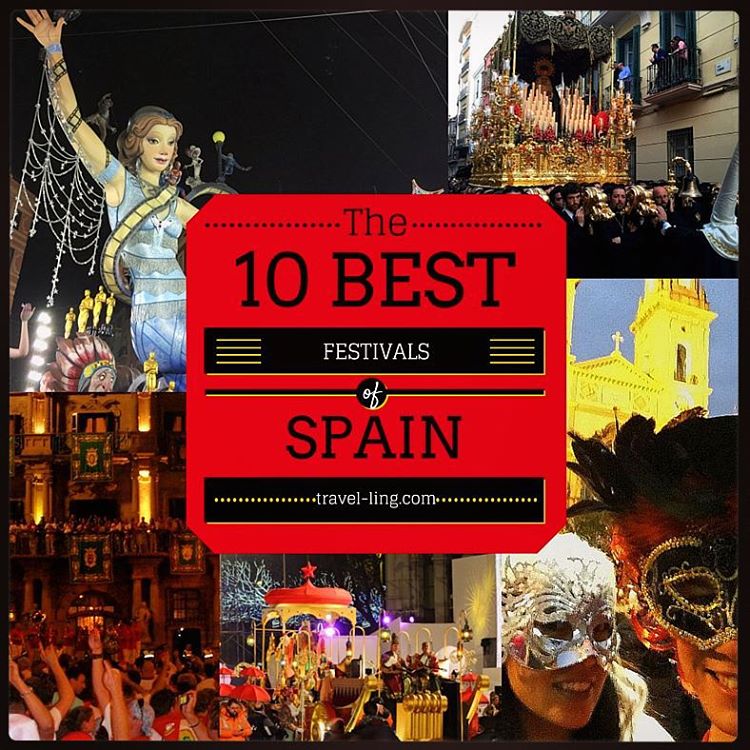
17 Things You Need To Know About the Auxiliares Program in Spain
17 Things You Need To Know About the Auxiliares Program in Spain
It’s that time of year again, Auxiliares Program Applications!
Ever dream about fields of oranges, olives and almonds? Find yourself daydreaming about flamenco dancers and bullfighters?
Do you salivate over the thought of trying various tapas? Wishing that your days included mandatory nap times?
If you are thinking of any of the above and wishing to live ‘la vida loca’ in Spain, the Auxiliares program could be the way to do it! Granted, it does involve teaching English to Spanish students, but no reward comes without some work, right? Applications for the 2016-2017 Auxiliares Program open 12 January 2016 at www.educacion.gob.es/profex, but you can prepare yourselves in the meantime by getting your CV ready online, and reading below the things you need to know about the Auxiliares Program.
1. The Auxiliares Program: First in, best placed
Think of the program and the placement locations as a waitlist. Basically, the lower your application number, the better chances you have of getting your first regional preference. This isn’t always guaranteed though, as 2nd year renewals get absolute first priority of selected regions, and if you are late to the game and someone has dropped out of the program after placements have already started, you may be lucky enough to get what you are after. Generally speaking though, the earlier you apply and the lower your inscrita number, the better chances you have of being placed in your preferred region.
Not sure what region to pick? Liz Carlson from Young Adventuress has written a great overview of all of the Spanish regions that you can read here. If you want my opinion, ¡Vive Andalucía!

2. The application and visa process is repetitive and lengthy
If you’ve already had a chance to look at the online application for the program, you will have noticed it can be a bit repetitive and lengthy. It doesn’t end there. Once you’ve applied, you’ll get an email saying “Inscripción solicitud”. This just means that your application was received online and that you need to post the documents to the consulate or regional office. Once done, you will receive an email “Registro de solucitud”, confirming your paperwork has been received and is being processed. Then, a few days later, you’ll get another email “Solicitud admitada”, meaning that your application has been approved. Don’t get too excited yet, as you still have two more correspondences to receive over the coming months to find out where exactly you are.
When you eventually get the email saying “Adjudicación de plaza,” this means you’ve been given a place within a region, to which you need to accept asap and receive a follow-up email “Aceptación de plaza” confirming that you’ve accepted your regional placement. You then won’t hear anything else for months, where you will be left biting your nails to the cuticles wondering where exactly you will end up. Finally, you’ll get an official letter stating the town and schools you are placed in to which you have to respond your acceptance within a tight timeframe. Then you are left waiting again to hear from the schools. Some schools are proactive and will contact you fairly shortly after your placement, and other schools will leave you wondering if you have been scammed, as you won’t hear from them until the day you rock up to your placement on the 1st of October.
The Visa is a whole other story. You need to apply for your visa no more than three months prior to your entry date into Spain. For me, the visa process was easy and straightforward, however auxiliares from different countries with different embassies have had less luck. Once you get your visa though, it’s the NIE/TIE issue that you have to deal with in Spain. Without repeating a post I’ve already written here, the process is slightly confusing and lengthy, requiring you to make several appointments with the Extranjeros office in your local region.
3. You may (or may not) get paid on time
This depends on your region and your school. Generally speaking, you get paid monthly in arrears (so your first pay won’t arrive until after your first month of teaching). I was in Andalucía and was paid at the beginning of each month, but only when I was at the school to sign for the transfer. If I wasn’t at the school at the beginning of the month (for example, over Christmas/New Years), I wouldn’t be paid until I was there. This wasn’t a huge problem for me, but many others from the region reported not being paid for months at a time. Be prepared to be pushy and ask for help from your co-ordinators or regional contacts to get paid if needed. It’s also a good idea to save as much as you can before you get to Spain so you have back-up cash in case you aren’t paid on time (plus, the more savings you have, the more you can use to travel!).

4. You will be teaching in subject areas you may have no idea about
My time teaching was split between a primary school and high school. I was often placed in bilingual classes, where specific subjects were taught in English whilst you were there. In the high school, I was placed in Maths, Biology, Chemistry, Physics, History and Ethics classes. Sadly for my high school colleagues, I did not study those subjects at school (bar Maths and Biology), so had less knowledge than the kids at times (Arts majors unite!). To the disappointment of my Science Teacher, I was unable to really “teach” Physics, since the theory went way over my head. Instead, I helped with pronunciation, general knowledge of Australia and conversation practice with the students.
5. The school system (and behaviours) may not be what you are used to
Having done teaching back in Australia, I was quite shocked to learn all students call teachers by their first names and often speak over the teachers. This was more evident in high school, but generally the acceptable behaviour in the classroom was a little lower than what I was used to back in Australia. In saying that though, I’ve had my fair share of difficult classes in Australia too! They also don’t have lunch at school, but short snack breaks so they can enjoy their siesta with their family once school finishes. Oh, and kids are so open about going to the toilet! They will actually tell you they have to poo or pee instead of just asking to go to the toilet. And they often don’t bother closing the toilet doors, so you will be teaching and at times see a child, from the corner of your eye, sitting on a toilet (this is only in the primary school).
6. 3-Day Weekends!
As the program is 12 – 16 hours a week, the schools normally try to fit your timetable over four days, normally allowing you the option to choose whether to have Mondays or Fridays off. Before you decide, have a look at the academic calendar for your region to see which days the long weekends tend to fall on and then select the opposite (so then you will only have to work three days when there is a ‘puente’). If you are super lucky, your school may fit all of your contact hours to three days overall, but I hear this is becoming rarer and rarer.
7. You get more long weekends than you do back home
Spanish people love a good holiday and there are plenty going on in Spain. It seems as though every saint gets some kind of holiday here, which works out well for us as it means long weekends! What I did (and urge any keen traveller to do), was print out the academic calendar, highlight all of the public holidays and long weekends (known as ‘puentes’ in Spain) and come up with some travel plans in advance. Flights can be super cheap if you book them early enough, and you can make the most of having a few long weekends by visiting other Spanish cities or countries within Europe.



Find ways to plan your travel on the cheap, with the Travel-Ling Guide to Planning Travel or 5 tips to save for your European Adventure
8. Your pay *should* cover your living expenses
This comes down to where you live, if you are sharing accommodation and what kind of lifestyle you have. Even though eating out in Spain is probably one of the cheapest places in Europe, it’s still cheaper to buy groceries and eat at home the majority of the week. Most regions pay €700 per month (but the Madrid region pays €1,000 due to a higher cost of living, and more teaching hours). Bear in mind that this wage is actually the minimum wage for full-time work in some regions of Spain! Read more about the Costs of Living in Spain.
9. You will meet amazing people
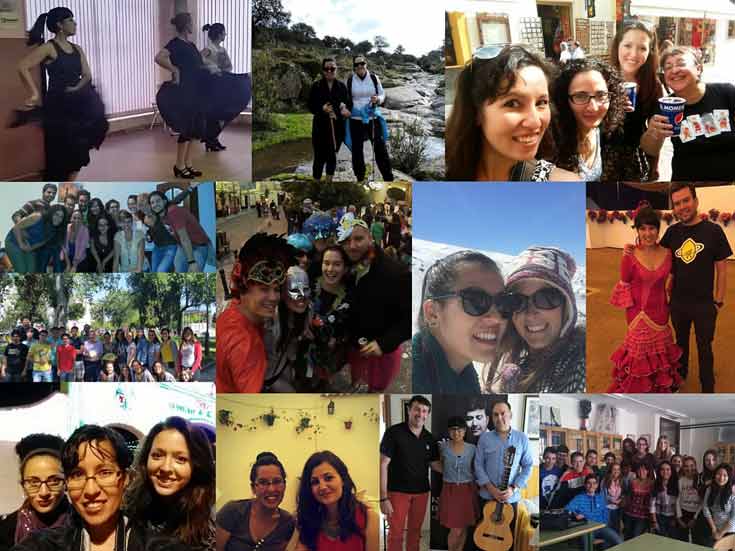
I met some amazing people, who I still keep in touch with. Some friends were also from the auxiliares program and I also made wonderful friendships with locals from my town. We partied at Cádiz Carnaval, learnt to dance flamenco, went searching for Game of Thrones actors in Osuna, and learnt to make some delicious croquettas with all of our newfound friends and family.
10. You will be expected to make lessons and resources
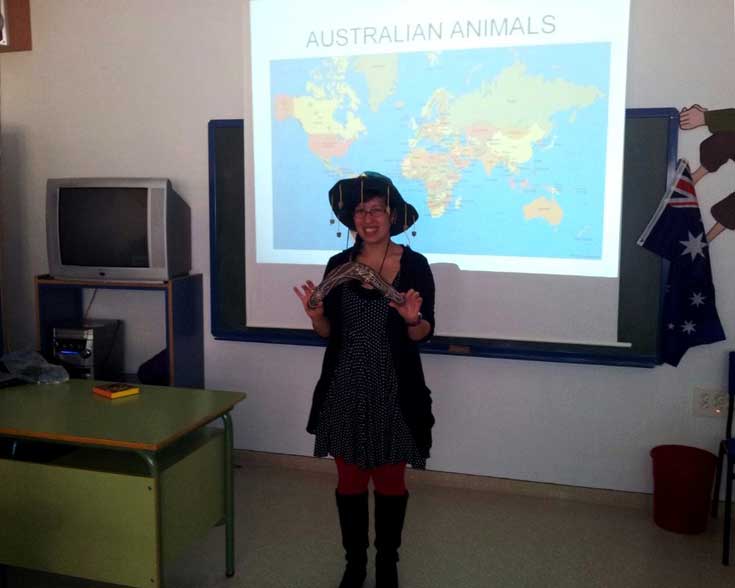
I hear this is an aspect of the job that is getting more and more involved for auxiliares. Some auxiliares were up every night making powerpoints, creating worksheets and marking work. Depending where you are placed, and who you talk to, this isn’t what is expected of you. I was advised that at times I will be in charge of creating lessons, activities and resources, but by no means should I be doing the work for the teacher. Your 12 hours (or 16 if you are in Madrid) are your class contact hours, but you may have to put in an hour or so outside of these contact hours to prepare for classes and assist teachers. There needs to be a balance and open line of communication between you and your colleagues. Don’t get taken advantage of, but don’t be a lazy bum either. Remember, you are being paid what is the minimum full-time wage for some regions (and only for a fraction of the hours!).
11. You will question your own grasp of the English language
So many times I was left wondering about grammar rules or if I had been pronouncing a word wrong my entire life. On one occasion, a teacher pronounced sword as written, emphasising the W. When I pronounced “sawed”, he questioned me and asked why we pronounce it that way when it’s spelt differently. I couldn’t get Genie from Aladdin pronouncing the W in sword during the song “Prince Ali” and I had to rush home and ask five different native English speakers just to make sure I wasn’t wrong! (Which I wasn’t by the way; English is just ridiculous).
12. You will get sick
Ask any past Auxiliar, and unless they have the immunity of the gods, they got sick at one point. For starters, kids don’t cover their mouths when they cough and I have never seen so much snot in my life than during my time in the Infantil (Preschool) classes. So many times I had to stifle a laugh (and maybe a little vom) when a kid has sneezed what looks to be a part of their brain all down their face. I’m talking multi-coloured, thick snot running down a marathon from their nostrils to their chin. To which they turn to a teacher and say through a moist, green mouth “Tengo moco” (I have mucus) and the teacher hurriedly ushers them to the closest tissue box or mop. The diet can also be a change for some. Whilst there is so much wonderful fresh food in the stores, eating out will expose you to a world of deep fried everything. No paleo, low-carb or atkins diets going on here.
13. If you can’t speak Spanish, you will quickly need to learn
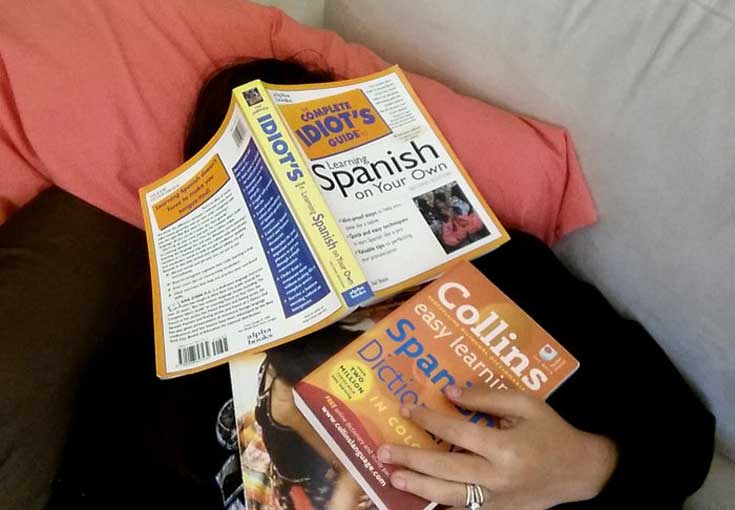
If the whole application and information process being in Spanish hasn’t given you a clue of what you are in for, I don’t know what will. We all found it quite amusing that the orientation sessions in Spain were all conducted in Spanish, and the presenters couldn’t speak English. Thank goodness for my colleague who came along with me to clear up anything I didn’t quite understand! Whilst you aren’t expected to speak Spanish at school (in fact, they encourage you not to let the students know you can understand Spanish), the majority of your colleagues won’t speak English and you will need to be able to have a basic understanding of it in your day-to-day living. If you end up in a pueblo, chances are you are one of the few English speakers in town. That means simple things that we take for granted like going grocery shopping, looking for an apartment (ask a colleague for help if you are stuck!), getting a sim card or ordering food will mostly be done in Spanish. The good news is your Spanish will improve reasonably quickly, and there is no shortage of opportunities to practice.
14. Selecting to live in a large city doesn’t guarantee you will
I believe it is Question 4 on the Auxiliares program application that asks you “¿En qué tipo de población desea trabajar?” (Where would you like to work?). You have five options, ranging from a big city to rural areas. I selected “Zona urbana ciudad grande” (Big City) and “Zona urbana ciudad mediana” (Town) honestly expecting, like most would, to end up in one of Spain’s main cities like Madrid or Sevilla or a smaller city such as Córdoba or Cádiz (still with a population of 300,000+). I ended up in Pozoblanco, a village with a population of 17,000, an hour away from Córdoba. Not that I’m complaining. In the end I loved my home, but be warned, that you may not get what you select here!

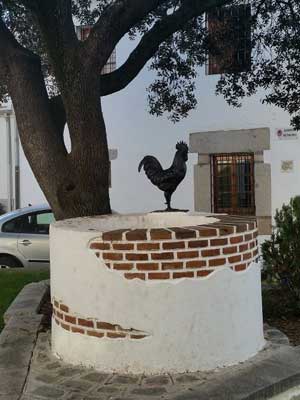

15. The best resources are ones you don’t have to carry
So many people have asked about what resources to take with them before heading to Spain to do the Auxiliares program. My advice, save your suitcase space for important stuff like clothes and shoes. You won’t know what classes you will be in until you get there, so there’s no point dragging books halfway around the world. If anything, create some powerpoints about your country and hometown. Feel free to bring props, such as your country’s flag and any other cultural items, but I really ended up regretting bringing the stuff I did. The best resources were songs, video clips, presentations, games and printable sheets I could store on my usb drive. There’s so many websites that have ideas for teaching English to foreign students, that you can get plenty of inspiration there. If anything, flashcards are great, but if you aren’t in a class that would use them, they are just another thing taking up precious weight and space in your suitcase.
16. Home Time means Home Time
Coming from teaching in Australia, I’m used to staying back at school for a couple of hours to work after the students have left. This doesn’t happen in Spain. Teachers will practically push kids out of their way to leave the school as soon as the bell goes. In fact, I was almost locked in at the high school when I went to have a bite to eat in the staffroom at 3:05pm. I had to find a cleaner to let me out as all of the staff and students had rushed home for their siesta.
17. If you have to commute, try carpooling or car hire
If you find yourself being placed in a pueblo, but want to live in a bigger city and commute, consider blablacar, commuting with a colleague (if you are lucky enough to have one living in your chosen city and commuting) or, if you are over 25, hiring a car. Car hire can be relatively cheap if you hire for a certain period of time. It seems as though hiring between 28 – 30 days works out cheaper than hiring for longer or shorter periods. Alyssa and James from She Went To Spain also did the Auxiliares program and rotated car hire every month and saved heaps on travel costs. They also had the freedom to go wherever they wanted to on weekends. Be warned that speeding tickets aren’t cheap and cheap car hire isn’t always guaranteed! If you are keen to do car hire though, check out RentalCars.com.
Are you considering applying for the Auxiliares program? Or have you previously completed the program? Let us know your thoughts in the comments below.
This post contains some affiliate links. Booking via these links won’t cost you any extra, but will help me get closer to my dream career, so thank you in advance!



